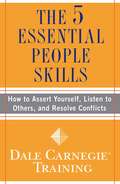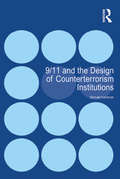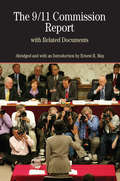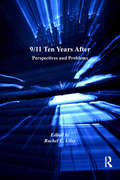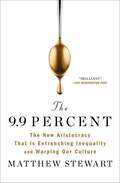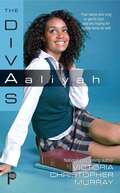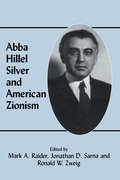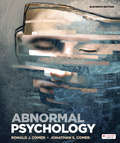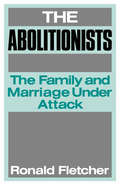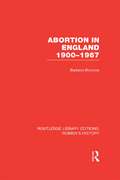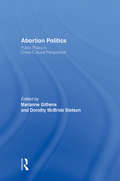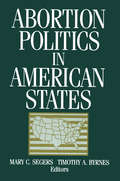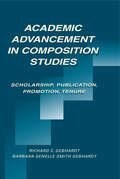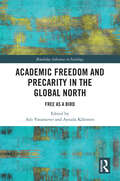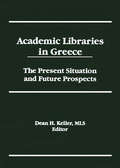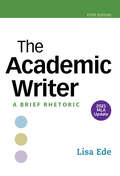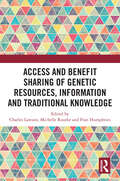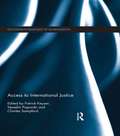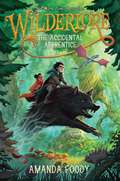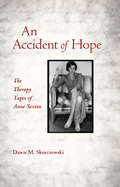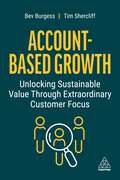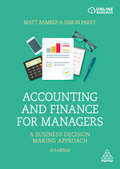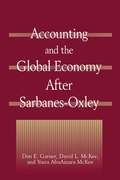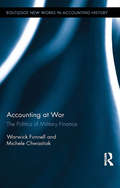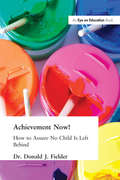Special Collections
Benetech’s Global Certified Accessible Titles
Description: Benetech’s GCA program is the first independent third-party EPUB certification to verify ebook accessibility. By creating content that is born accessible, publishers can meet the needs of all readers. Learn more: https://bornaccessible.benetech.org/
- Table View
- List View
The 5 Essential People Skills
by Dale Carnegie TrainingFrom one of the most trusted and bestselling brands in business training and throughout the world, The 5 Essential People Skills shows how to deliver a message to others with power and clarity, how to build loyalty and inspire creativity by demonstrating assertiveness, and how to be assertive.Put these five essential skills to work and begin your transformation! Have you ever walked away from a conversation full of doubts and insecurities? Do you feel as if you've lost a little ground after every staff meeting? Most of us are either too passive or too aggressive in our business life, and we end up never getting the support, recognition, or respect we desire. The business leaders and trainers from Dale Carnegie Training have discovered that applying appropriate assertiveness to all your interactions is the most effective approach to creating a successful career. The 5 Essential People Skills will help you be the most positively commanding, prosperous, and inspired professional you can be. You will learn how to: · Relate to the seven major personality types· Live up to your fullest potential while achieving personal success · Create a cutting-edge business environment that delivers innovation and results · Use Carnegie's powerhouse five-part template for articulate communications that grow business· Resolve any conflict or misunderstanding by applying a handful of proven principles Once you master these powerful skills, you will be well on your way to a new level of professional and personal achievement.
9/11 and the Design of Counterterrorism Institutions
by Michael KarlssonHow did the North European states react to the terrorist attacks in the United States on September 11, 2001? Michael Karlsson argues that 9/11 led to a considerable pressure to strengthen rules and practices for counterterrorism and security, but that this pressure was mediated by several other conditions. The reforms were also affected by, among other things, how the threat of global terrorism was perceived, pressure from international institutions such as the UN, EU, and NATO, the domestic political context, and pre-existing rules and practices. His analysis uses the new institutionalism framework, tested through case studies of Denmark, Sweden, Finland, Estonia, Latvia, and Lithuania. The book offers a unique lens on the study of counterterrorism from a new theoretical and regional perspective.
The 9/11 Commission Report
by Ernest MayGain a firsthand account of the National Commission on Terrorist Attacks' methods and actions as 9/11 Commission Report with Related Documents walks you through the drafting process despite the bitter political divisions surrounding the commission.
9/11 Ten Years After
by Rachel E. UtleyTen years on, what have been the principal impacts of the terrorist attacks of 11 September 2001 on the external policies and international outlooks of the world's major powers, the range and scope of the international security agenda and on the capacity for states and international organisations to work together to combat the dangers of international terrorism? This book investigates a range of international responses to the events of 9/11, to evaluate their consistency over time; to analyse their long-term significance and impact and to consider both their implications for the international security agenda and the prospects for international cooperation in addressing the challenges posed. In particular, the book considers the perspectives of some of the world's major powers and international organisations on the question of international terrorism, and on its perpetrators, comparing their interpretations and responses and examining how these have changed over the course of a decade of conflict. This book is primarily directed at an academic market, and especially towards undergraduate and taught postgraduate students on courses in international politics, international relations, security studies, terrorism studies, and contemporary international history.
The 9.9 Percent
by Matthew StewartA scorching, trenchant, analysis of how the wealthiest group in American society is making life miserable for everyone—including themselves.In 21st century America, the top 0.1% of the wealth distribution have walked away with the big prizes even while the bottom 90% have lost ground. What&’s left of the American Dream has taken refuge in the 9.9% that lies just below the tip of extreme wealth. Collectively, the members of this group control more than half of the wealth in the country—and they are doing whatever it takes to hang on to their piece of the action in an increasingly unjust system. They log insane hours at the office and then turn their leisure time into an excuse for more career-building, even as they rely on an underpaid servant class to power their economic success and satisfy their personal needs. They have segregated themselves into zip codes designed to exclude as many people as possible. They have made fitness a national obsession even as swaths of the population lose healthcare and grow sicker. They have created an unprecedented demand for admission to elite schools and helped to fuel the dramatic cost of higher education. They channel their political energy into symbolic conflicts over identity in order to avoid acknowledging the economic roots of their privilege. And they have created an ethos of &“merit&” to justify their advantages. They are all around us. In fact, they are us—or what we are supposed to want to be. In The 9.9 Percent, Matthew Stewart argues that a new aristocracy is emerging in American society and it is repeating the mistakes of history. It is entrenching inequality, warping our culture, eroding democracy, and transforming an abundant economy into a source of misery. He calls for a regrounding of American culture and politics on a foundation closer to the original promise of America.
Aaliyah
by Victoria Christopher MurrayFrom the bestselling author of The Personal Librarian comes the fourth book in the The Divas series.Diamond, India, Veronique, and Aaliyah are fifteen-year-old high school sophomores on their way to becoming the hottest new group to hit gospel music—The Divas. That is, if they win the team talent competition. Now, the fourth book in the series follows Aaliyah, as she comes face to face with a secret from her past.. Straight-A student and &“brainiac&” of the group, Aaliyah is an only child living with her father, the deputy Chief of Police in Los Angeles. Even though Aaliyah isn&’t interested in singing, she&’s shown a remarkable, natural talent since childhood. It takes a bit of persuading to get Aaliyah to be a part of the Divas, but she gives in, and joins the group to be close to her friends. During one of their rehearsals, the girls hear a song by Zena, a successful African American singer. All the other girls are inspired and imagine themselves being as successful one day—except for Aaliyah, who turns off the CD and grumbles that they can find a better role model. Then, when Aaliyah learns that Zena will be attending their performance—accompanied by her father—her whole world comes crashing down. And all of her friends, who&’d been told that Aaliyah&’s mother died when she was a baby, suddenly realize where her natural singing ability came from…
Abba Hillel Silver and American Zionism
by Jonathan D. Sarna and Mark A. Raider and Ronald W. ZweigThe essays collected here investigate Rabbi Silver's Zionist political leadership, his impact on American Judaism, ideological orientation and relations with the leaders of the Palestine Jewish community, World Zionist Organization and the Jewish State.
Abnormal Psychology
by Ronald Comer and Jonathan ComerComer’s widely adopted textbook shows students where the study and treatment of psychological disorders stand today. In addition to a thorough updating, the new edition employs some extraordinary interactive tools to bring students face to face with the realities of psychological dysfunction, organized for easy access and assignability.
The Abolitionists
by Ronald FletcherIn The Abolitionists (a companion volume to The Shaking of the Foundations) Ronald Fletcher turns his attention to those critics who have advocated the abolition of the family. Blaming the strength of the family for all discontents, they see the family as the deeply entrenched last bastion of an exploitative capitalist society - an obstacle to social progress and a prop for patriarchy. These new critics have exerted a growing influence throughout the 1970s and 1980s, and this is the first book to subject them to a systematic critical appraisal. The Abolitionists is a controversial and impressive defence of the modern family shaped by a century and a half of humane reform.
Abortion in England 1900-1967
by Barbara BrookesOver the decades from 1900 to 1967 abortion was transformed from an important female-centred form of fertility control into a medical event, closely monitored by the State. This transition, the author argues here, took place against a background of debate over fertility control and its implications for women’s maternal role. The book, originally published in 1988, suggests that the inter-war years saw a crucial mapping of boundaries in the debates over abortion. The distinction between methods of fertility control used before and after conception was more sharply drawn. The abortion law was difficult to enforce and in 1936 the Abortion Law Reform Association was founded by feminists to call for safe legal abortion as a woman’s right. Resort to criminal abortion continued in the post-war years and the number of therapeutic abortions also began to increase. The medical profession’s attempt to create a distinction between worthy medical and spurious social reasons for fertility control gave way in the face of women’s demands for safe and effective means to plan when and if they would have children. After a hard-fought battle, the abortion law was reformed in 1967. The abortion decision, however, remained firmly in the hands of the medical profession.
Abortion Politics
by Marianne Githens and Dorothy McBRIDE StetsonAbortion Politics: Public Policy in Cross Cultural Perspective focuses on current abortion policy and practice in the United States, Canada, Europe and Japan and aims to provide a comprehensive, stimulating and balanced picture of current abortion policy in a cross-cultural perspective. The contributors deal with comparative abortion policy including recent developments in Ireland, Germany and Eastern Europe.
Abortion Politics in American States
by Timothy A. Byrnes and Mary C. SegersThe essays presented here draw from the Soviet Interview Project's evidence of the internal condition of the CPSU party during the "era of stagnation" and its role, influence, and impact on the operation of legal and economic institutions and state bureaucracies.
Academic Advancement in Composition Studies
by Richard C. Gebhardt and Barbara Genelle Smith GebhardtThis volume deals with a number of related issues that are becoming increasingly crucial for English studies during this time when most faculty in the field are assistant professors approaching tenure review or associate professors seeking promotion. These critical issues focus on: * The diversity of research and scholarly publication in composition studies; * The fact that composition studies faculty are often evaluated by personnel committee members, department chairs, and deans unfamiliar with the nature and demands of the field; * The way that American higher education is rethinking "scholarship" and the role it plays in the work and evaluation of faculty members; and * The role composition studies faculty can play in this review of scholarship and professional advancement. This book seeks to address the entire spectrum of "composition studies" -- expository and argumentative writing, personal essay, literary nonfiction, technical and business writing, historical rhetoric, empirical research, and more -- by understanding the nature of and evaluating the work of faculty members in this broad field. Scholarship and advancement issues are discussed in a variety of situations including basic and regular first-year composition classes at four-year and two-year institutions or writing centers, advanced writing courses, ESL and skills-development programs, and writing classes and programs for teachers, administrators, and researchers. The chapters focus on a variety of subjects, including the importance of mentoring and faculty development in all departments and institutions; and how young scholar-teachers and assistant professors can prepare for a successful personnel or tenure review.
Academic Freedom and Precarity in the Global North
by Aslı Vatansever and Aysuda KölemenWith contributions from six leading scientific countries of the Global North and from the general European Higher Education Area, this book questions the predominant view on academic freedom and pleads for a holistic approach. While academic freedom has been a top agenda point for the global scientific community in recent years, the public and academic discourse has often been marked by a negative interpretation of the term understood merely as exemption from state intervention and censorship. The contributions in this edited volume demonstrate, however, that this is not where the story ends: the ability to exercise academic freedom not only involves the freedom of expression in its abstract sense but should involve the capability to determine research agendas and curricula independently from market pressures or threats of career sabotage, and to resist workplace misconduct without fear of losing future career chances. Providing a differentiated picture of contemporary structural limits to academic freedom in advanced democracies, this volume will be of great interest for not only scholars of higher education, but for the entire academic community.
Academic Libraries in Greece
by Dean H KellerBecome better informed about Greek academic librarianship at a time of great potential for changes and advances in academic libraries in Greece! Rapid changes are occurring in these libraries as more professionally and technically trained Greek librarians are available, contact with American, British, and European librarians is increased, and new technology becomes readily available. Academic Libraries in Greece provides complete information on such varied subjects as automation, collection development, departmental libraries, education for librarianship, interlibrary loan, and library management, pointing out past experiences, current activities, and future prospects. There is an historical overview of Greek academic libraries and some libraries are described in some detail. The contributors, who include Greek, American and British librarians or education specialists who have had an opportunity to work in or closely observe Greek academic libraries, provide a historical overview of the development of Greek academic libraries and detailed descriptions of some specific libraries.Academic Libraries in Greece address important issues in Greek academic librarianship such as: How did the modern Greek library develop and how does it operate? What are its specific automation needs and how can they be met? What is the current status of automation and what are the prospects for the future? How can new needs be met under the present system and what are the prospects for change? The history and current efforts of library training, and the value of foreign exchange programs and provides examples An in-depth analysis of a departmental library in GreeceLibrarians, education specialists, and students interested in international librarianship and education, and especially those who have an interest in the situation in Greece, will find invaluable first hand accounts of the views and understanding of professionals who have recently been on the scene. Library science faculty teaching library history, international librarianship, or how library theory and practice is applied in a foreign setting will be greatly interested in this insightful text.
The Academic Writer with 2021 MLA Update
by Lisa EdeThis ebook has been updated to provide you with the latest guidance on documenting sources in MLA style and follows the guidelines set forth in the MLA Handbook, 9th edition (April 2021).The Academic Writer is a brief, affordable guide that’s the ideal introduction to college writing.
Access and Benefit Sharing of Genetic Resources, Information and Traditional Knowledge
by Charles Lawson, Michelle Rourke and Fran HumphriesAddressing the management of genetic resources, this book offers a new assessment of the contemporary Access and Benefit Sharing (ABS) regime. Debates about ABS have moved on. The initial focus on the legal obligations established by international agreements like the United Nations Convention on Biological Diversity and the form of obligations for collecting physical biological materials have now shifted into a far more complex series of disputes and challenges about the ways ABS should be implemented and enforced. These now cover a wide range of issues, including: digital sequence information, the repatriation of resources, technology transfer, traditional knowledge and cultural expressions, open access to information and knowledge, naming conventions, farmers’ rights, new schemes for accessing pandemic viruses sharing DNA sequences, and so on. Drawing together perspectives from an interdisciplinary range of leading and emerging international scholars, this book offers a new approach to the ABS landscape; as it breaks from the standard regulatory analyses in order to explore alternative solutions to the intractable issues for the Access and Benefit Sharing of genetic resources. Addressing these modern legal debates from a perspective that will appeal to both ABS scholars and those with broader legal concerns in the areas of intellectual property, food, governance, Indigenous issues, and so on, this book will be a useful resource for scholars and students as well as those in government and in international institutions working in relevant areas.
Access to International Justice
by Vesselin Popovski and Charles Sampford and Patrick KeyzerThere is much debate about the scope of international law, its compatibility with individual state practice, its enforceability and the recent and limited degree to which it is institutionalized. This collection of essays seeks to address the issue of access to justice, the related element of domestic rule of law which does not yet figure significantly in debates about international rule of law. Even in cases in which laws are passed, institutions are present and key players are ethically committed to the rule of law, those whom the laws are intended to protect may be unable to secure protection. This is an issue in most domestic jurisdictions but also one which poses severe problems for international justice worldwide. The book will be of interest to academics and practitioners of international law, environmental law, transitional justice, international development, human rights, ethics, international relations and political theory.
The Accidental Apprentice
by Amanda FoodyA New York Times bestseller! A boy who accidentally bonds with a magical Beast must set off on an adventure in the mysterious Woods in this &“wholesome, delightful&” (Kirkus Reviews, starred review), and cheeky middle grade fantasy debut—perfect for fans of Nevermoor and How to Train Your Dragon.The last thing Barclay Thorne ever wanted was an adventure. Thankfully, as an apprentice to the town&’s mushroom farmer, Barclay need only work hard and follow the rules to one day become the head mushroom farmer himself. No danger required. But then Barclay accidentally breaks his town&’s most sacred rule: never ever EVER stray into the Woods, for within the Woods lurk vicious magical Beasts. To Barclay&’s horror, he faces a fate far worse than being eaten: he unwittingly bonds with a Beast and is run out of town by an angry mob. Determined to break this bond and return home, Barclay journeys to find the mysterious town of Lore Keepers, people who have also bonded with Beasts and share their powers. But after making new friends, entering a dangerous apprenticeship exam, and even facing the legendary Beast of the Woods, Barclay must make a difficult choice: return to the home and rules he&’s always known, or embrace the adventure awaiting him. This paperback edition includes a brand new, highly-illustrated map of the Woods.
An Accident of Hope
by Dawn M. SkorczewskiIn 1956, Anne Sexton was admitted into a mental hospital for post-partum depression, where she met Dr. Martin Orne, a young psychiatrist who treated her for the next eight years. In that time Sexton would blossom into a world-famous poet, best known for her "confessional" poems dealing with personal subjects not often represented in poetry at that time: mental illness, depression, suicide, sex, abortion, women's bodies, and the ordinary lives of mothers and housewives. Orne audiotaped the last three years of her therapy to facilitate her ability to remember their sessions. The final six months of these tapes are the focus of this book. In An Accident of Hope, Dawn Skorczewski links the content of the therapy with poetry excerpts, offering a rare perspective on the artist's experience and creative process. We can see Sexton attempting to make sense of her life and therapy and to sustain her confidence as a major poet, while struggling with the impending loss of Orne, who was moving elsewhere. Skorczewski's study provides an intimate, in-depth view of the therapy of a psychologically tortured yet immensely creative woman, during a period of emerging feminism and cultural change. Tracing the mutual development of the poet and the therapist during their years together, the author explores the tension between the classical therapeutic setting as practiced in the early 1960s and contemporary relational and developmental concepts in psychoanalysis, just then beginning to emerge. An Accident of Hope also raises broader questions about the nature of healing in psychotherapy. The poet and therapist we encounter in these sessions present complex and conflicted images of the therapeutic and creative process. Orne, equal parts honesty and hesitancy, works to bolster Sexton's self-image and maintain that she is more than the sum of her poetry. Sexton, working against a tendency to hide from her most painful feelings, valiantly pushes to tell the truth in therapy, while her poems invite the readers to see another side of the story. Just as Orne kept the audiotapes so that one day they might help others who suffer, An Accident of Hope tells the story of a therapy but moves beyond it. By offering a glimpse into the past, the present is open for reappraisal, both of Sexton herself and the legacy of psychoanalytic treatment.
Account-Based Growth
by Bev Burgess and Tim ShercliffDevelop long-term relationships, deliver market-beating growth, and create sustainable value with this pragmatic guide to aligning marketing, sales, customer success and your executives around your most important customers.Many B2B companies make half their profitable revenue from just three percent of their customers, yet don't recognize the significance of these accounts, nor invest appropriately in them. Account-Based Growth introduces a comprehensive framework for improving internal alignment and external engagement with these vital few. It contains bullet-pointed takeaways at the end of each chapter plus a comprehensive checklist to help you improve your own company's approach to its most important customers.Each element of the framework is brought to life through viewpoints from industry experts and case studies from leading organizations including Accenture, Fujitsu, Infosys, SAP, Salesforce, ServiceNow and Telstra.
Accounting and Finance for Managers
by Matt Bamber and Simon ParryAccounting and Finance for Managers rebukes the myth that in order to excel in accounting and finance you need to be great at mathematics. Split into two broad sections which focus on financial accounting and management accounts, this textbook uses clear, accessible language that will appeal to students from a variety of academic backgrounds.Taking a uniquely practical approach that focuses on the financial aspects of business decisions, the textbook covers all the core topics of accounting and finance, including basic bookkeeping, financial analysis, business planning, cash-flow analysis and investment decisions. Now in its third edition, Accounting and Finance for Managers contains updates on new accounting standards and regulations, as well as featuring up-to-date real-world examples of real options, value chain analysis and competitive advantage analysis. This textbook features 'traditional' accounting practices in detail, but also covers topics with a strategic focus to ensure students learn to think in broader strategic terms. Written for an international audience using International Financial Reporting Standards (IFRS) terminology with supporting resources including additional exercise questions, curated further reading and lecture slides for each chapter.
Accounting and the Global Economy After Sarbanes-Oxley
by Don E. Garner and David L McKee and Yosra AbuAmara McKeeThis book is essential for students and practitioners in accounting, international business, finance, and economics. In a straightforward and readable style, it focuses on the changing accounting and auditing standards in national and global economies in the post-Enron/Arthur Andersen era. The authors clarify the reasons behind and consequences of the accounting profession's failure in auditing and self-regulation, as most firms placed consulting profits ahead of public audit duties. They show how Sarbanes-Oxley solutions, while not perfect, are major contributors to the profession's redemption, and have enabled it to rise to new heights of service and revenue. The book offers a detailed examination of accounting practitioners' past challenges and future prospects. It provides a realistic analysis of specific issues facing accounting and auditing firms today, including the growing problem of independence; the need for one set of international accounting standards and one set of auditing standards; adjustments facing the global financial system; and the impact of the Internet and communication systems on accounting firms.
Accounting at War
by Warwick Funnell and Michele ChwastiakAccounting is frequently portrayed as a value free mechanism for allocating resources and ensuring they are employed in the most efficient manner. Contrary to this popular opinion, the research presented in Accounting at War demonstrates that accounting for military forces is primarily a political practice. Throughout history, military force has been so pervasive that no community of any degree of complexity has succeeded in. Through to the present day, for all nation states, accounting for the military and its operations has primarily served broader political purposes. From the Crimean War to the War on Terror, accounting has been used to assert civilian control over the military, instill rational business practices on war, and create the visibilities and invisibilities necessary to legitimize the use of force. Accounting at War emphasizes the significant power that financial and accounting controls gave to political elites and the impact of these controls on military performance. Accounting at War examines the effects of these controls in wars such as the Crimean, South African and Vietnam wars. Accounting at War also emphasizes how accounting has provided the means to rationalize and normalize violence, which has often contributed to the acceleration and expansion of war. Aimed at researchers and academics in the fields of accounting, accounting history, political management and sociology, Accounting at War represents a unique and critical perspective to this cutting-edge research field.
Achievement Now!
by Donald FielderThis research-based book provides details on how educators can dramatically increase student achievement. It offers numerous experience-based ideas and strategies which can be applied to any school or district.This book will help you:- establish a results-oriented focus on the curriculum- increase time-on-task and academic rigor for ALL students- provide a supportive accountability system for all staff members- identify and eliminate educational practices that lower student achievement- introduce an achievement audit process that will increase student performance in any school or district
